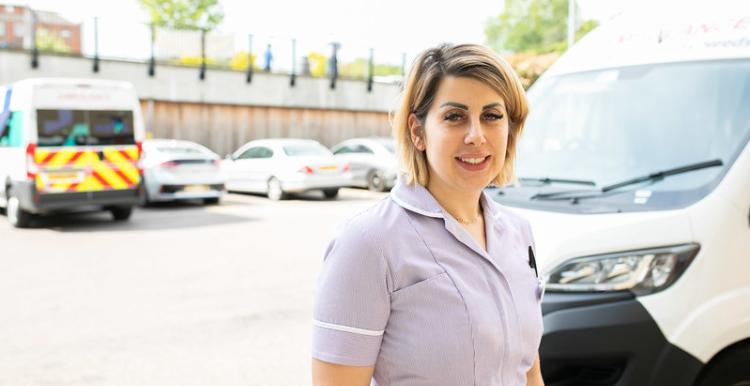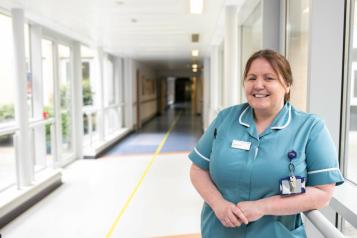Help Us Understand the Impact of Neighbourhood Nursing

In 2021, Guy’s and St Thomas’ made changes to the district nursing service in Lambeth. Healthwatch Lambeth worked with Guy's and St. Thomas' (GSTT) to speak to unpaid carers in the borough to understand more about their experiences before the changes were made.
The district nurses, or Neighbourhood Nurses as they are now called, provide care for people who are housebound or unable to visit their GP. These services might include help with wound care, diabetes care, taking blood, tube feeding and removing clips and stitches after an operation.
The aim was to find a better way of working that made it possible for people to see the same nurse more often, have more continuity of care and live independently. Research conducted in Holland showed that the Neighbourhood model was effective in reducing levels of staff sickness, turnover and burnout while improving general satisfaction for staff, patients and carers.
Here's what we found prior to the changes.
What we found:
- Carers and service users were visited by different nurses on each visit. This made it difficult for them to establish a routine for their visits and make themselves and their medical histories understood properly. Carers were particularly concerned about the stress on loved ones living with dementia who didn’t have a chance to get used to the nurses and build a relationship with them.
‘Not seeing the same nurse twice makes everything more difficult.’
- Carers and service users did not always know what help they could expect from the nurses and reported issues with communication, having to have multiple visits for the same problem, nurses who varied in their level of skill and experience.
‘I have confidence the nurses will do what they can but there seem to be issues when there is something slightly out of the ordinary.’
- Some carers and service users felt the nurses were not responsive enough when they raised a medical concern, which became more serious than it needed to be as a result of care being delayed. They wanted all nurses to be more flexible and to support them as carers to deal with any issues that might arise in future.
‘I know they’ve got a lot of responsibility and there’s a lot of pressure on nurses but they could be doing a bit more. They’re the ones who are qualified and they need to come out.’
- Carers, service users and staff were all coping with COVID-19 pressures. The pandemic put pressure on many unpaid carers to increase the amount of time and energy they gave to their responsibilities, such as becoming 24/7 live-in carers to their loved ones as one household.
‘With COVID-19, the nurses have been very stretched... I feel they assume I have more information and resources than I have and will be able to deal with things myself.’
‘Covid-19 made meetings more difficult. I had doorstep visits, or telephone only. It impacted my ability to have an overview of how the service ‘‘should’’ work.’
- Many carers and service users had positive experiences of nurse’s kindness during their visits and shared examples of good practice.
‘They explain to me what they’re going to do. It’s very helpful. They always say ‘‘Thank you for looking after your mum,’’ which I appreciate. Yes, they listen to her wishes. They answer her questions. They’ve always done really well in terms of care and listening to her. They’ve always been willing to try different options to find something that works.’
What has happened since?
Over the past two years:
- The Neighbourhood Nursing model has started to be used in Lambeth and Southwark and nurses have completed new training.
- Neighbourhood Nursing teams are based more centrally in each area, so they don’t have to travel as far, and appointment home visits are more efficient.
- Patients now have a ‘named nurse’ that they see more regularly, who are able to work more flexibly and make decisions about the care they provide.
- The nursing teams are now organised differently, with coaches instead of managers, allowing nurses to develop more specialist skills than they had previously.
- The pressures related to COVID-19 were heavily affecting nursing visits at the time Healthwatch Lambeth conducted their interviews, and restrictions have now been lifted.
What next?
Are you an unpaid carer for someone who has a Neighbourhood Nurse? We want to hear from you. A lot of work has gone behind the scenes and changes have been made to improve continuity of care and overall quality of the service. It takes time for staff, patients and carers to adjust to new ways of working, and the changes have been implemented in different areas of the borough at different times over the past two years.
As such, it's important for GSTT and Healthwatch Lambeth to know whether these changes have led to improvements for you and the person you care for, as this information helps to shape the service for everyone.
Healthwatch Lambeth have been asked to speak to carers and family members of patients that use the Neighbourhood Nursing service. This will help us understand your experience of this new way of working, whether it has had an impact on your role as a carer and the experience of the person you care for. We are also getting feedback from patients directly.
If you are happy to share your views, an Engagement Officer from Healthwatch Lambeth will carry out a telephone interview with you at a date and time convenient to you. The conversation will last between 30 and 45 minutes.
During the conversation, we would like to discuss things like:
- A bit about your caring role
- Experience of the nursing service for the person you care for
- The ways in which the new service may have affected your role as carer, whether positive or negative
Your views will help to improve the service, but it’s your choice whether or not to take part. Healthwatch will not tell Guy’s and St Thomas’ Trust who is giving feedback. Anything you say will be treated as strictly confidential and won’t have any impact on the care received by the person you care for.
If you are interested in taking part, please contact Sara at Healthwatch, email: sara.lyon@healthwatchlambeth.org.uk or call: 07943 986 256. You will be offered a shopping voucher to the value of £30 as a thank you.
Please note that:
- You can change your mind about giving feedback at any time
- If you have already given feedback previously, you can choose to speak to Healthwatch again as your experience may be different now that changes have been made.
- Your contact details will not be used for any other purposes and will be destroyed within three months of the project being completed
- Not everyone who expresses an interest may be invited to take part (for example, if lots of people get in touch with Healthwatch).
